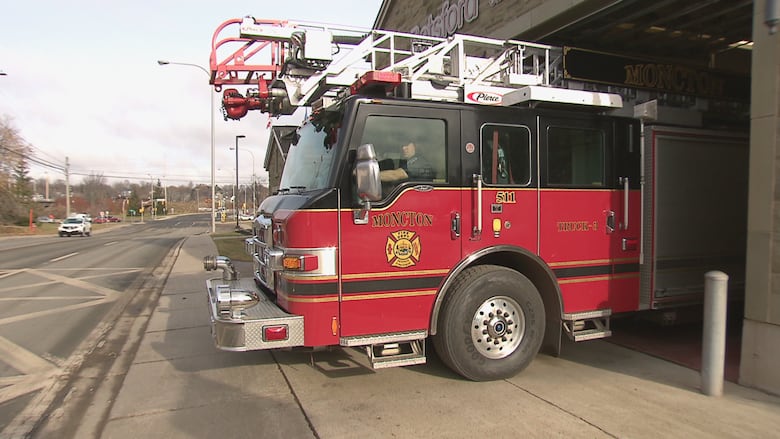Weekend fires stretched Moncton Fire Department, chief and union say
Both call for more staffing as southeast New Brunswick city grows rapidly

After two challenging fires in Moncton on Sunday, fire officials are saying they need more staff to cope with city growth.
Every firefighter in the city's five fire stations responded to the fires at two multi-family residential buildings.
"It was a very stressful situation, and it takes many people to do all those tasks in a safe way," Ashley Graham, a fire captain and president of the Moncton Firefighters Association, said in an interview with Information Morning Moncton.
The city does have mutual aid agreements with surrounding departments such as Riverview and Dieppe, but "they have their own incidents going on as well," Graham said. The concern is about the potential for many emergencies happening at once.

"I don't want the public to be afraid," Graham said. "We have amazing men and women working 24 hours a day, 365 days a year. We just want to keep planning for the future. The last thing I want to do is fear-mongering, I just want to make sure we're planning correctly for the future.
"But it's also for the safety of the firefighters as well because they get stressed out, maxed out when you get to a situation like they had the other night."
Graham said more tasks had to be done than there were firefighters at the scene.
"We want to make sure we're proactive, not reactive," Graham said.
The Moncton region has the second-fastest-growing metro population in the country, Statistics Canada reported in May.
Jeff Preston, the city's general manager of protective services, said in an email that the city recognizes growth is happening fast.
"All of these changes do require an adjustment in our ability and capability of dealing with a variety of fire incidents," Preston said.
He said situations like that on Sunday "do not happen frequently," and he cited the mutual aid agreements the city has in place.
Preston said has hired a company to look into resources and staffing for the fire department over the next 10 years. The study will be finished by the end of this year and become a new master plan, but in the meantime, four new firefighters have recently been hired.
Department study in the works
Chief Conrad Landry said the master plan will help inform city council to make proper decisions.
"That's what the study is going to tell us: what's the recommendation for a city our size?" Landry said.
The city now has 115 contracted firefighters, with a minimum of 21 on staff working across the five fire stations every day.

Graham said the minimum staffing level hasn't changed since the 1970s. Even when the Hildegard station was added in the 1990s, the numbers didn't increase, but firefighters were just moved to the new station.
A volunteer firefighter program existed from the 1970s to the 1990s but was stopped because it was difficult to recruit members, he said.
An insurance underwriter study done by the department last year suggested that Moncton could need another ladder truck and engine, which could require up to 30 to 40 additional firefighters, Graham said.
New high-rise buildings going up across the city are also a concern, which Graham said requires more firefighters to be staffed.
"We have over 50 high rise buildings in the city now, it's growing, which is great. But [the insurance study] also looks at our response times. If there's a fire on the top floor of one of these buildings, how long does it take us to get there to that top floor, and with the right amount of manpower to be able to fight that in a safe way?"
He said he hopes the master plan will take the insurance study recommendations into consideration so that the city can be safe.
Landry said part of the agreement when the department asked for the master plan was that it must take into account the insurance report.
"I think it's just the matter of having the right information, the right recommendations, the experts making these recommendations to council to decide where they want to spend the funds," Landry said.
The 10-year plan will also cover the need for any new stations, he added.

